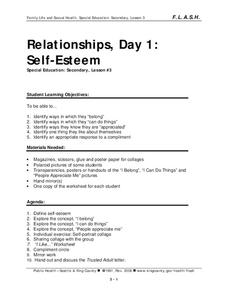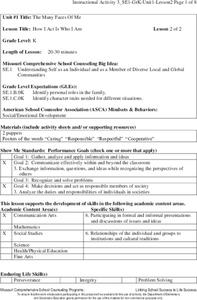Curated OER
Sexual Education Assessment Tool: Special Education
The FLASH program in Seattle has put together a set of questions for special education classes covering sexual education. Some of the topics include appropriate, inappropriate, self-esteem, puberty, hygiene, reproduction, and sexually...
Curated OER
Reproduction, Day 4: Sexual Decision-Making
Every human has the need for affection. This lesson teaches mild to moderately disabled secondary students to make good choices regarding sexual contact. The lesson is developmentally and age appropriate and covers topics such as sexual...
California Department of Education
Due Dates, Deadlines, and Decisions
Get high schoolers thinking about their post-secondary plans with a lesson plan that teaches them how to navigate the application and financial aid process. They create a junior/senior calendar identifying time-sensitive tasks,...
Curated OER
Relationships, Day 5: Acquaintances & Strangers
It is important for special needs students to know the differences between acquaintances and strangers. They define the world helper, acquaintance, and stranger then discuss a scenario based case study.They talk about touch and no touch,...
Curated OER
Relationships, Day 1: Self-Esteem
Expose your secondary special education class to the importance of belonging and feeling accepted. They define self-esteem, pride, and appreciation. Then create a self collage and share what they like about themselves with the class. A...
Curated OER
Exploitation, Day 1: Touching
Developmentally Disabled students need to know they types of touch, appropriate touching, and their personal rights. They brainstorm types of touch, go over their personal rights, and discuss social skills. Very appropriate activity for...
Curated OER
Communication, Day 3: Asking What You Want
Mild to moderately disabled secondary students practice asking for what they want. They discuss a scenario, list things they want, then practice asking for those things. Our special needs students need to know how to communicate...
Curated OER
Communication, Day 5: Saying "No"
There are many ways to say, no. Secondary special needs students need to know when and how to say no when they feel they are in an uncomfortable situation. They sign, say, and role-play how to say no. Worksheets and role-playing cards...
Curated OER
Relationships, Day 4: Friendships & Dating
It is so important to help special needs individuals know the difference between dating and friendship. They define friendship, differentiate between friends and strangers, role-play, practice greetings, then talk about dating. This...
Curated OER
Communication, Day 2: Assertiveness
Having social skills and being able to assert yourself in a positive way is so important. Students with mild to moderate disabilities engage in a series of activities to practice assertive communication and social skills. Perfect for a...
Curated OER
Exploitation, Day 2: Exploitation and Getting Help
Exploitation is a real issue for the disabled community. Secondary Special Education students learn what exploitation is, their personal rights, and how to say no. They focus on finding a trusted adult to get help if they have been taken...
Curated OER
Private & Public
Some disabled young scholars have a difficulty understanding what is and what is not publicly appropriate behavior. Help them build healthy social skills by defining public and private behaviors, labeling public and private places, and...
Curated OER
HIV/AIDS & Other STDs, Day 1: Germs & Risk
Assist your secondary special education class for understanding risky behavior, hygiene, and STDs. The class discusses how germs spread, how people get sick, and what needs to be done to prevent the spread of communicable diseases. They...
King Country
Lesson 7: Relationships - Day 5: Acquaintances & Strangers
What is the difference between a friend and an acquaintance? What about an acquaintance and a stranger? As part of a unit on Family Life and Sexual Health (FLASH), class members role play appropriate responses to situations involving...
Missouri Department of Elementary
How I Act Is Who I Am
A lesson centers itself around the topic of family roles. A whole-class discussion uses puppets and posters to go in-depth into the following character traits; caring, responsibility, respect, and cooperation. The discussion closes with...
California Department of Education
Me and My Career
Your career search starts here! Sixth grade scholars begin their journey toward college and career readiness in the first of a five-part series of lessons. Individuals identify where their interests lead them using the Holland code, then...
King Country
Lesson 3: Relationships - Day 1: Self-Esteem
A sense of belonging, of being capable, of being appreciated, and the role these feelings have in our self-esteem is the subject of the third lesson in a family life and sexual health unit.
King Country
Lesson 13: Communication - Day 6: Decision-Making
Decision making, including decisions that are made for us by others, decisions that are easy to make, and those that are not are the focus of a skill-building lesson plan that provides class members with a four-step decision-making...
Missouri Department of Elementary
Celebrate Your Culture
After a class discussion about celebrations and customs, class members draw pictures depicting special events from their family cultures. Next, they draw pictures of an event from a different culture and share their work with classmates.




















